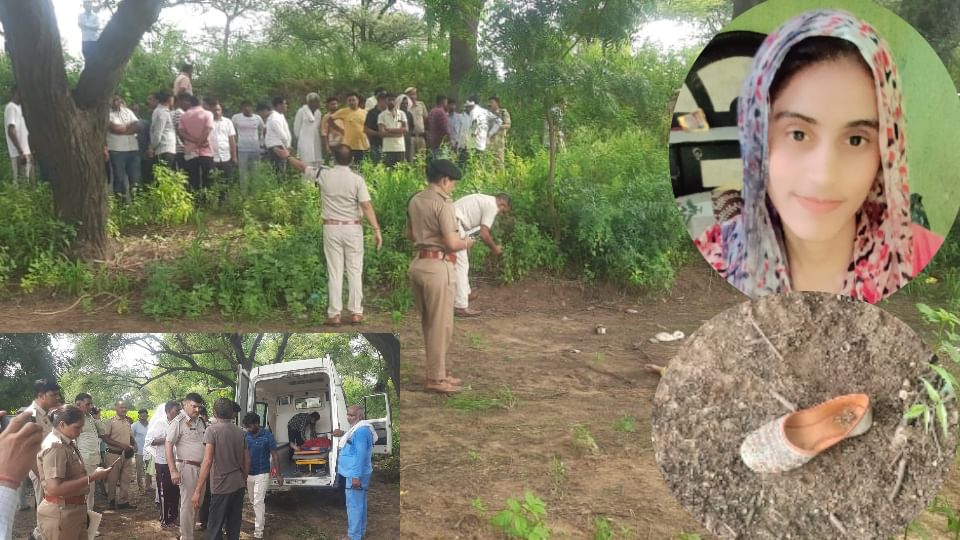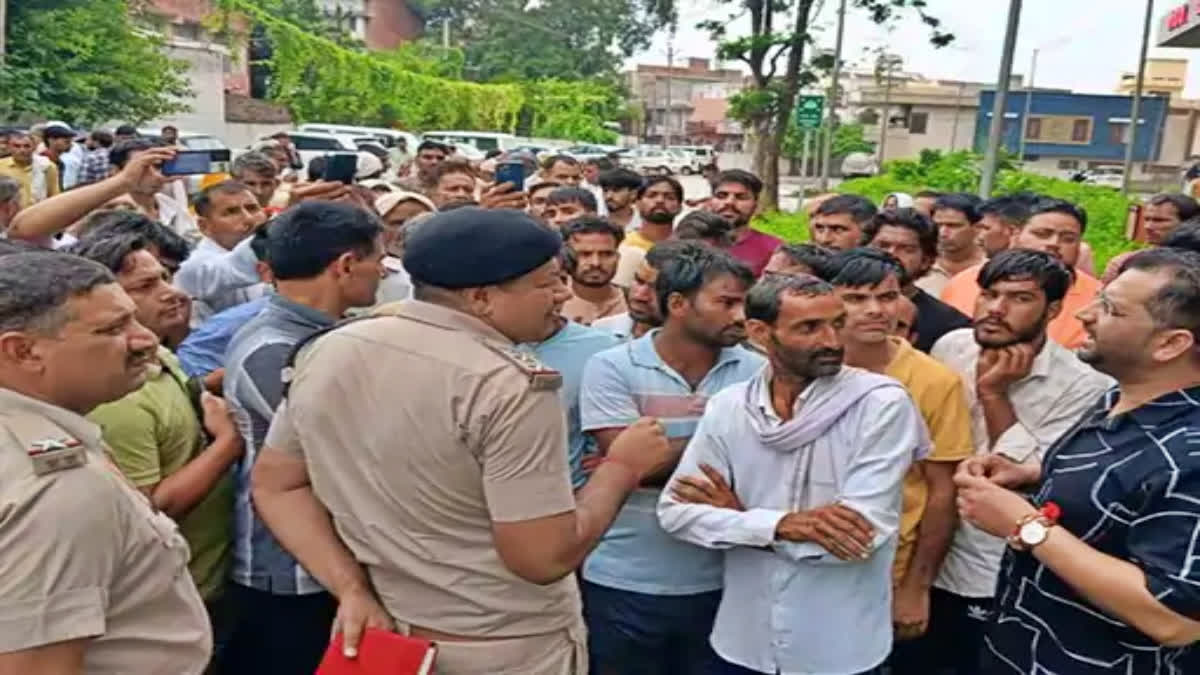The brutal murder of a teacher in Bhiwani has triggered shock, anger, and deep sorrow across Haryana, with the victim’s family demanding a fresh postmortem report and alleging lapses in the ongoing investigation. The incident has sparked widespread debate on the state of law and order, with former Chief Minister Bhupinder Singh Hooda strongly criticizing the government for what he termed a “complete failure of security and governance.” The case has gained momentum as grieving relatives, activists, and opposition leaders unite in demanding justice for the slain teacher.
According to reports, the teacher was found dead under suspicious circumstances, leading to allegations that the crime may have been premeditated and linked to personal enmity or broader criminal conspiracies. However, the family has expressed dissatisfaction with the initial autopsy, alleging discrepancies and lack of transparency in the medical findings. They have called for a fresh postmortem conducted under independent supervision to establish the exact cause of death. This demand has intensified public pressure on the authorities, who are already under scrutiny for perceived mishandling of crime investigations in the region.
The murder has also shaken the teaching community, with several educators expressing fear and outrage at the growing risks faced by professionals in smaller towns. Many have pointed out that teachers, often respected as the backbone of society, are increasingly vulnerable to crimes that go unsolved or poorly investigated. The Bhiwani case has therefore become a symbol of larger systemic failures in protecting citizens, particularly in rural and semi-urban areas where law enforcement is already stretched thin.
The demand for a fresh postmortem in the Bhiwani teacher murder case has added urgency to the investigation. Families of victims often look to medical reports as the first credible step toward truth, and when that process itself comes into question, the entire justice mechanism faces credibility issues. The teacher’s relatives have highlighted contradictions in the earlier findings, which they believe may conceal key evidence. Such dissatisfaction with autopsy reports is not uncommon in India, where forensic procedures are often criticized for lacking transparency, modern equipment, and proper oversight, particularly in cases with political or criminal sensitivities.
The public anger following this case also points to deeper social issues surrounding the safety of individuals in rural Haryana. Teachers, though respected in society, face the same risks as ordinary citizens when law enforcement is weak. Locals argue that crime rates are steadily rising, with murders, kidnappings, and violent attacks being reported regularly. The teacher’s murder has become a flashpoint, symbolizing a society where law and order appear fragile. Many residents fear that unless systemic changes are brought in, such tragedies will continue, eroding community trust in governance structures and creating widespread insecurity.
Civil society groups and NGOs have also stepped into the debate, demanding accountability not only from the police but also from the government. Activists argue that the case exposes gaps in investigative procedures, from preserving evidence to handling sensitive medical examinations. They have called for external oversight, suggesting that institutions like the Central Bureau of Investigation (CBI) or independent forensic boards could provide a fairer inquiry. While these calls reflect growing frustration, they also reveal how deeply faith in state-level institutions has declined in cases involving violence and political ramifications.
The legal community, too, has expressed concern over the handling of the murder. Several lawyers have emphasized that if the initial postmortem was flawed, then the chances of securing a conviction in court diminish significantly. A defense lawyer could easily exploit such discrepancies to create doubt, potentially allowing the accused to escape punishment. Therefore, the demand for a fresh autopsy is not only about truth for the family but also about ensuring that the legal process remains strong enough to deliver justice. Without reliable forensic evidence, even the most determined investigation may collapse in trial.

Former CM’s Sharp Criticism of Law and Order
Former Haryana CM Bhupinder Singh Hooda has used the incident to highlight what he described as a collapse of law and order in the state. In his statement, Hooda accused the ruling government of negligence, pointing to rising incidents of violent crimes that remain unresolved. He stressed that the Bhiwani teacher’s murder underscores the urgent need for accountability, transparency, and reform in policing practices. Hooda further alleged that the state’s failure to maintain basic security standards reflects poorly on its ability to govern effectively. His remarks have added a political dimension to an already sensitive case.
Hooda’s intervention has amplified the case’s visibility, placing the current administration in a defensive position. The government, meanwhile, has claimed that an investigation is ongoing and that all suspects linked to the case are being tracked. However, critics argue that such assurances are insufficient in the absence of tangible progress. For the victim’s family, political blame games provide little solace, as their demand remains straightforward—a fresh and credible postmortem report that can clarify unanswered questions about the cause of death and possibly point towards the real perpetrators.
Political consequences are also intensifying around this case. The opposition Congress party, led by former CM Hooda, is using the incident to challenge the credibility of the current government. By framing the murder as a symbol of law-and-order collapse, the opposition seeks to corner the ruling party ahead of crucial elections. Such politicization, however, runs the risk of overshadowing the victim’s plight. For the family, the priority remains justice, not electoral games. Yet in India’s highly charged political climate, cases like these often become battlegrounds for parties, complicating the pursuit of truth with layers of political maneuvering.
The police have tried to reassure the public by claiming progress in the case, but skepticism persists. Many residents point out that such assurances have been given in past cases too, with little outcome. Families of victims often end up waiting for years as investigations drag on or collapse due to insufficient evidence. The teacher’s case has reignited debates about police reforms, particularly the need for independent investigative wings, better training in forensic science, and greater accountability to prevent political interference. Unless these structural issues are addressed, such high-profile failures will likely repeat themselves.
The incident has also stirred conversations about the treatment of teachers in society. While educators are often celebrated in public discourse, their real conditions of safety and security remain neglected. The Bhiwani murder has sparked solidarity movements among teachers across Haryana, with unions demanding better protection and faster investigations in crimes involving their community. They argue that if teachers, who hold a moral position in society, are not safe, then the safety of ordinary citizens cannot be guaranteed either. Their protests add weight to the demands for urgent justice in this case.
Beyond Haryana, the Bhiwani murder has resonated nationally, drawing attention from media outlets and political commentators. The tragedy underscores the fragile state of law and order in several parts of India, where violent crimes often highlight systemic weaknesses. National debates have questioned whether Haryana’s government is capable of handling rising crime, with comparisons being drawn to other states facing similar issues. By reaching national headlines, the case has increased pressure on authorities to ensure visible progress, as failure to do so could damage the state’s reputation on a much larger scale.

Conclusion
The Bhiwani teacher murder case represents more than just a local crime; it is a powerful reflection of eroding trust in law enforcement and governance. The victim’s kin, supported by opposition leaders and sections of the public, are determined to seek justice through a transparent investigation and an independent medical review. Whether the government acts swiftly to address these concerns will shape not just the outcome of this case but also public confidence in Haryana’s justice system. For now, the case remains a rallying point for demands of accountability, fairness, and urgent systemic reform.
The psychological toll on the victim’s family cannot be overstated. Losing a loved one to violence is devastating, but the added uncertainty of not knowing the truth behind their death deepens the trauma. The family’s demand for a fresh postmortem is therefore also a quest for closure, an attempt to reconcile with their loss by ensuring that the facts are laid bare. Psychologists note that when justice systems fail to provide clarity, families often experience prolonged grief, unable to move forward due to unanswered questions. In this case, closure is tied directly to forensic transparency.

Ultimately, the Bhiwani teacher murder case has become a mirror of governance, justice, and society’s vulnerabilities. It is no longer just about one crime but about the broader system’s ability to function under pressure. Whether the authorities agree to a fresh postmortem, ensure accountability in the investigation, and deliver justice swiftly will determine the future of trust between the state and its people. The stakes extend beyond this single tragedy; they touch upon how ordinary citizens perceive their safety, how institutions uphold their duties, and how democracy ensures fairness in the face of injustice.
Follow: Bhupinder Singh Hooda
Also read: Home | Channel 6 Network – Latest News, Breaking Updates: Politics, Business, Tech & More

